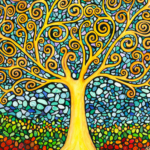 This summer has been a time of awakening for so many of us. In the wake of the killings of George Floyd, Armaud Arbery, and countless others, as well as the Black Lives Matter protests that have propelled people across the globe to confront racism, I have been thinking deeply about how our Mussar practice can provide a lens to engage in the work of racial justice.
This summer has been a time of awakening for so many of us. In the wake of the killings of George Floyd, Armaud Arbery, and countless others, as well as the Black Lives Matter protests that have propelled people across the globe to confront racism, I have been thinking deeply about how our Mussar practice can provide a lens to engage in the work of racial justice.
As I spent hours reading and thinking, I was struck by how so many of the concepts and middot we employ in our study of Mussar have relevance to the discussion of antiracism. These include:
- Savlanut/Patience – our impatience with the pace of change, as well as our wasted grief over emotions like shame and guilt that get us stuck in paralysis;
- Emet/Truth – our willingness to confront the “white-washing” of our history and commit to reeducating ourselves and the next generation;
- Nichutah/Calmness – overcoming judgment in the form of unconscious bias;
- Shtikah/Silence — on the one hand, the complicity of silence in the face of oppression, and on the other, the lashon hara of microaggressions;
- Tzedek/Righteousness and Just Action – bearing the suffering of others as our burden by working to repair systemic racism.
Mussar calls us to be awake, to hear the cry of the other when they stand before us in physical or psychic pain. When we hear our other crying out both literally and metaphorically–“I Can’t Breathe”–how do we as Mussarniks answer that cry?
Rabbi Israel Salanter, the founder of the modern Mussar movement, taught that the material needs of the other serve as our spiritual canvas. Hody Nemes, of the Jewish Climate Action Network, writes that Rabbi Salanter taught that humans were created as frail mammals “in order that they should know and feel the pain and misery of others, share in their suffering and their longings, understanding the needs of other people, their lives and their wants, their desires and yearnings” (quoted in Shearit Menachem). It is our very earthliness that makes us capable of empathy, says R. Salanter. Thus, when we struggle to breathe, we are reminded of our common humanity.
I invite you to join me this fall as CCM launches a class for CCM graduate students in Antiracism Through Mussar in which we will engage in deep study and conversation about race and racism through a Mussar lens (see flyer below). I hope that this will be the start of a CCM-wide program to take our Mussar consciousness out into the world to move toward tikkun, a more just and loving world.
Wishing you peace, equanimity and health in the New Year,
Nancy
